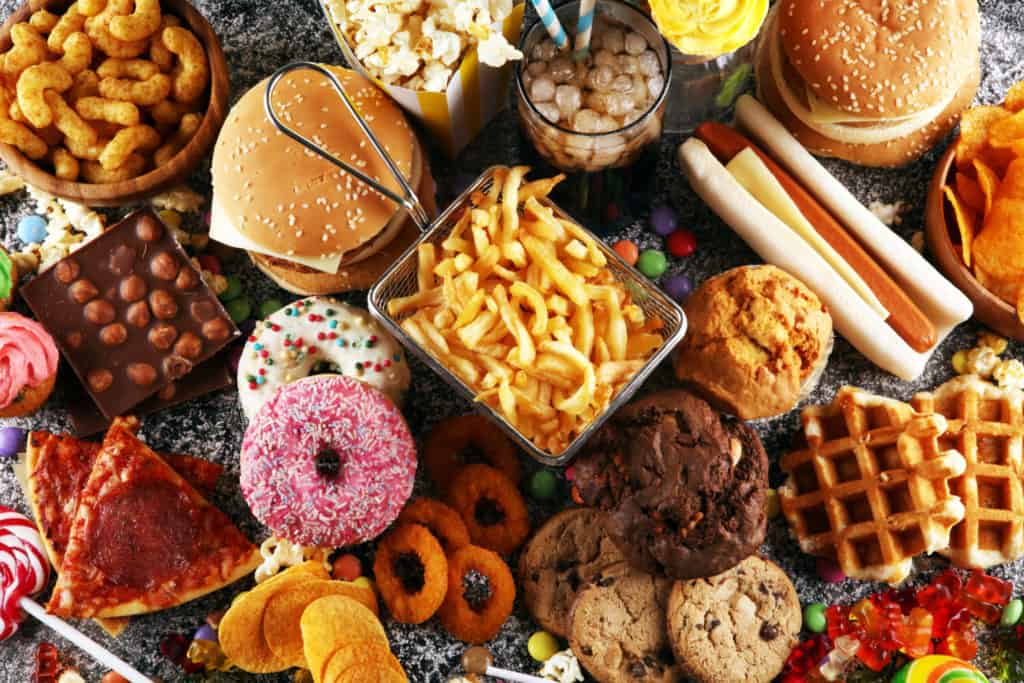Ultra-processed food has become a regular part of our daily diet. A new study has determined that consumption of ultra-processed food is associated with an increased risk in falling prey to cardiovascular diseases and even death.
Dangers Of Consuming Ultra- Processed Food
What is this ultra-processed food and are all foods that comes in a box ultra-processed?
Food items can be split into three categories:
- Unprocessed/ Minimally processed foods – Vegetables, fruits, grains, nuts, fresh seafood etc.
- Processed foods – Foods that have been altered without being detrimental to health. Usually, additions are made by way of sugar, oil or salt.
- Ultra-processed foods – These foods go through multiple, extensive processes containing many added ingredients which have been manipulated. For eg: soft drinks, chocolates, and candies, chips and fries, nuggets and hotdogs, packaged soup and ice-cream, etc.

Most of these food items have not only made their way to our plates but have even become the favorite part of our meals. Many food items marketed as healthy such as protein bars sweetened breakfast cereals and most industrially produced bread are also ultra-processed food causing damage and increasing risk to your heart with every bite you take.
Filippa Juul, a faculty fellow at New York University School of Public Health, is the lead author of this new study. Juul and her group looked at data from a long-term U.S. study based on more than 3000 middle-aged people. A questionnaire was prepared and presented by researchers to assess their diets and get details regarding their consumption of various foods.
Participants whose consumption of ultra-processed food was the highest faced higher incidences of cardiovascular events such as heart diseases and deaths due to heart problems. The study has found that there appears to be a relationship between the amount of ultra-processed food being eaten every day and an individual’s heart risk.
Stephanie Schiff, a registered dietician at Northwell Health’s Huntington Hospital in Huntington, N.Y, on reading the study pointed out that people are going further and further away from ‘real’ foods and have started to accept foods with additives that most have no knowledge about, food that mimics ‘real’ food.
Now that we know the problem, how do we go about solving it?
The best way to reduce/ delete ultra-processed foods from our diets is to start cooking at home using natural/ whole foods. According to Schiff, a positive twist in this coronavirus pandemic times is the return of home cooking using whole food ingredients by those stuck inside due to lockdown. She adds that with lockdowns, even social media is tempting people to bake their own bread, roast their own veggies and brew their own coffee.
Juul and her group believe that population-wide strategies must be implemented. These strategies may include taxation on sugar-sweetened beverages and other ultra-processed food, national dietary guidelines on recommendations with processing levels of foods.
Nicole Roach, a cardiac dietician at Lenox Hill Hospital in New York City, gives a few tips we can follow when food shopping:
- Shopping at the perimeter of the supermarket – Usually, center aisles will carry canned, packaged, and processed foods while the outer perimeter will carry fresh stock.
- Reading food labels – The ingredient list is written in descending order of quantities. Avoid choosing foods with many non-beneficial ingredients, processed/ refined sugars, and additives.
Schiff suggests that we all should take a page out of our parents’ and grandparents’ and great-grandparents’ generations and start cooking at home to prioritize health over anything else. She also recommends making the consumption of whole foods a fun activity full of joy rather than a chore.
It will be very difficult or even impossible to recover from the consequences of consumption of ultra-processed foods.
You can check out the Journal of the American College of Cardiology for detailed findings on the study published on 22 March 2021.
Dr. Stacy tyree is an American surgeon and author. She specializes in vascular surgery and bariatric surgery. She is also known for helping morbidly obese people to lose weight. Dr. Stacy tyree owns Doctor of Medicine degree and completed a Rotating Surgical internship at St. Johns Hospital. She has written several scholars on obesity.
